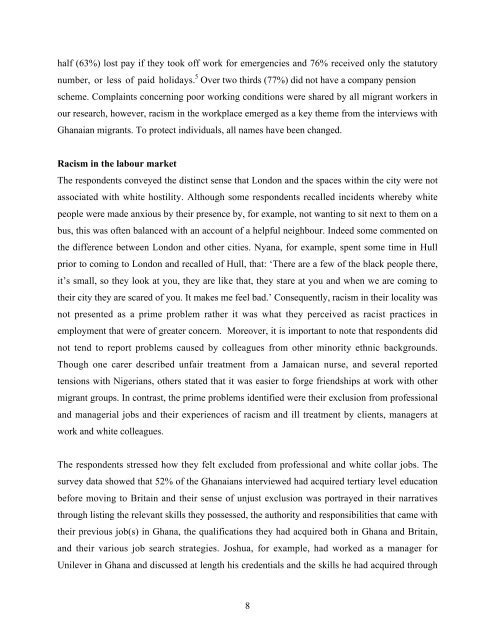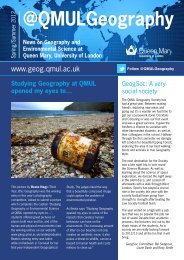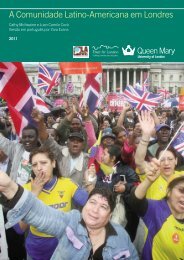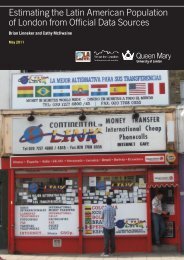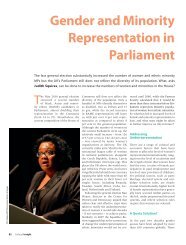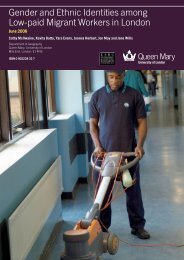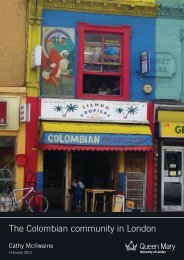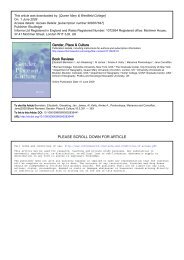Multiculturalism at work: The experiences of Ghanaians in London
Multiculturalism at work: The experiences of Ghanaians in London
Multiculturalism at work: The experiences of Ghanaians in London
- No tags were found...
You also want an ePaper? Increase the reach of your titles
YUMPU automatically turns print PDFs into web optimized ePapers that Google loves.
half (63%) lost pay if they took <strong>of</strong>f <strong>work</strong> for emergencies and 76% received only the st<strong>at</strong>utorynumber, or less <strong>of</strong> paid holidays. 5 Over two thirds (77%) did not have a company pensionscheme. Compla<strong>in</strong>ts concern<strong>in</strong>g poor <strong>work</strong><strong>in</strong>g conditions were shared by all migrant <strong>work</strong>ers <strong>in</strong>our research, however, racism <strong>in</strong> the <strong>work</strong>place emerged as a key theme from the <strong>in</strong>terviews withGhanaian migrants. To protect <strong>in</strong>dividuals, all names have been changed.Racism <strong>in</strong> the labour market<strong>The</strong> respondents conveyed the dist<strong>in</strong>ct sense th<strong>at</strong> <strong>London</strong> and the spaces with<strong>in</strong> the city were notassoci<strong>at</strong>ed with white hostility. Although some respondents recalled <strong>in</strong>cidents whereby whitepeople were made anxious by their presence by, for example, not want<strong>in</strong>g to sit next to them on abus, this was <strong>of</strong>ten balanced with an account <strong>of</strong> a helpful neighbour. Indeed some commented onthe difference between <strong>London</strong> and other cities. Nyana, for example, spent some time <strong>in</strong> Hullprior to com<strong>in</strong>g to <strong>London</strong> and recalled <strong>of</strong> Hull, th<strong>at</strong>: ‘<strong>The</strong>re are a few <strong>of</strong> the black people there,it’s small, so they look <strong>at</strong> you, they are like th<strong>at</strong>, they stare <strong>at</strong> you and when we are com<strong>in</strong>g totheir city they are scared <strong>of</strong> you. It makes me feel bad.’ Consequently, racism <strong>in</strong> their locality wasnot presented as a prime problem r<strong>at</strong>her it was wh<strong>at</strong> they perceived as racist practices <strong>in</strong>employment th<strong>at</strong> were <strong>of</strong> gre<strong>at</strong>er concern. Moreover, it is important to note th<strong>at</strong> respondents didnot tend to report problems caused by colleagues from other m<strong>in</strong>ority ethnic backgrounds.Though one carer described unfair tre<strong>at</strong>ment from a Jamaican nurse, and several reportedtensions with Nigerians, others st<strong>at</strong>ed th<strong>at</strong> it was easier to forge friendships <strong>at</strong> <strong>work</strong> with othermigrant groups. In contrast, the prime problems identified were their exclusion from pr<strong>of</strong>essionaland managerial jobs and their <strong>experiences</strong> <strong>of</strong> racism and ill tre<strong>at</strong>ment by clients, managers <strong>at</strong><strong>work</strong> and white colleagues.<strong>The</strong> respondents stressed how they felt excluded from pr<strong>of</strong>essional and white collar jobs. <strong>The</strong>survey d<strong>at</strong>a showed th<strong>at</strong> 52% <strong>of</strong> the <strong>Ghanaians</strong> <strong>in</strong>terviewed had acquired tertiary level educ<strong>at</strong>ionbefore mov<strong>in</strong>g to Brita<strong>in</strong> and their sense <strong>of</strong> unjust exclusion was portrayed <strong>in</strong> their narr<strong>at</strong>ivesthrough list<strong>in</strong>g the relevant skills they possessed, the authority and responsibilities th<strong>at</strong> came withtheir previous job(s) <strong>in</strong> Ghana, the qualific<strong>at</strong>ions they had acquired both <strong>in</strong> Ghana and Brita<strong>in</strong>,and their various job search str<strong>at</strong>egies. Joshua, for example, had <strong>work</strong>ed as a manager forUnilever <strong>in</strong> Ghana and discussed <strong>at</strong> length his credentials and the skills he had acquired through8


